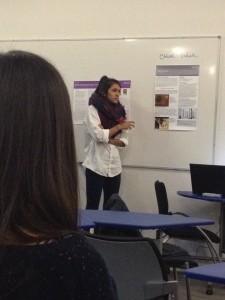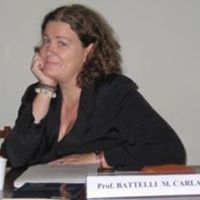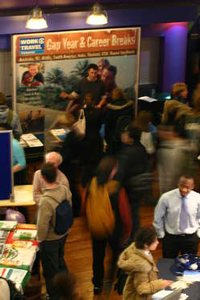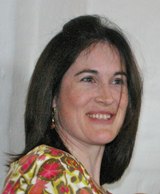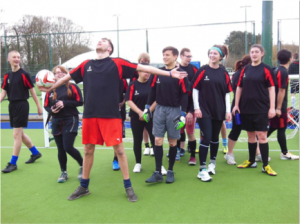Yesterday afternoon, students in Dr Charles Leavitt’s final-year Italian module IT3AF: After the Flood – Italy 1945-1956, gave their research poster presentations. Students investigated a wide variety of topics, then presented and discussed their research findings with colleagues in the Italian section. We’ve asked Sarah Thurmer, who presented an innovative poster on advertisements in the Italian journal Rinascita last year, to share her thoughts on conducting and sharing research as an advanced undergraduate. Here’s what she had to say:
Two years ago now, I was set to choose my final year Italian modules while still away on my Erasmus placement in Padua, Italy. The module IT3AF appeared on a list and I was presented with the term ‘After the Flood’ for the first time. As a French and Italian student, I had the chance to choose only two Italian modules and with six available I had more than enough to choose from, but IT3AF caught my eye immediately. At the time, I was writing my dissertation on the spread of western communism in France and Italy after the Second World War, and I was therefore drawn to this module, which would allow me to study the cultural and political debates in the post-war period – fantastic!
Just weeks into the programme and my final year back in Reading, I began to realise that After the Flood was turning out to be the most challenging, rewarding and enjoyable module I had ever taken.
The module was at its core was an introduction to the critical analysis of a selection of texts, novels, films and journals and Dr Leavitt presented us with a schedule of seminars for the year with lists of everything we would be analysing and when, as well as detailing the assessment and deadlines. He also arranged weekly film viewings outside of seminar hours so that we could together watch a collection of unforgettable films from the dopoguerra (post-war period) in Italy.

Lorenzo Corradi leads a discussion on the USA’s policy of communist containment and its effects in post-war Italy.
As students, we had all the information we needed and what came next was up to us. I soon realised if I was to really engage with the content and participate in what became very heated and inspiring in-class discussions, I needed to read everything and I mean everything.
For the first time, I was reading the short stories, the novels, the poems and the articles not because I had to, but because I wanted to. For a student who always avoided literature and stuck to the safety of solid facts in history textbooks, IT3AF was allowing me to take the ideas and values expressed by authors and directors and apply them to the history and politics of the period.
Not only did the novels, a favourite of mine being Uomini e No by Elio Vittorini, compliment what I already knew about the dopoguerra, they allowed me to view the period through different eyes and see past the tables of election results or industrial production figures.

Helena Moore presents her research on Italian survivors of the Shoah and their re-integration in Italy.
I was already enjoying the module and then in the Spring Term, the study of journals was introduced and this is where I really engaged.
After an exciting guest lecture from Dr Mila Milani, a post-doctoral researcher at the University of Reading, three post-war Italian journals were presented to us and all students picked one to work on. I chose Rinascita, simply because I found Palmiro Togliatti, the journal’s editor and the head of Italy’s Communist Party, an interesting figure.
I can remember nervously withdrawing the journals from the library’s closed-access collection. I immediately loved reading them. I loved analysing the images, the poems, the advertisements and of course the long articles, all in Italian, and I was excited to use to them to produce coursework.
At this point in the year, we were all being given the freedom to take the study of these journals, (or even the films, novels and poems) in whatever way we wanted within the bounds of the assessment deadlines. I know that I, along with my classmates, found this the most exciting part of the module.
Dr Leavitt enjoyed listening to our interpretations and ideas and was happy to help us further study the area we engaged with most. Many of us had never created conference posters, let alone presented them to our peers and lecturers. Yet through the study of the journal Rinascita and the flexibility to pursue the area I engaged best with, I confidently presented a poster which gained me the highest mark of my degree and fantastic feedback from everyone involved.
Students and lecturers alike enjoyed the poster presentation session and it was a great way to end the module and the year on a high. I even felt confident going into the exam because I had really connected with the content rather than reading texts simply because they were on the reading list and I wasn’t left cramming information and lecture slides the night before the exam.
IT3AF filled me with confidence in my studies and I look back on it now as a module I really enjoyed, something I know I am not alone in. The ability to pursue our own research, voice our own opinions and informally debate with one another made it different to anything I had studied before.
Looking back on my university experience six months after graduation, I realise it is no longer as important what mark I gained for each essay or presentation, but the skills I gained from the research, production and assessment of my work will stay with me as I continue my studies and embark of my professional future.
In IT3AF with Dr Leavitt, learning went from being a series of lectures and seminars with predicted outcomes to being an in-depth analysis of all relevant resources at my disposal and a collaboration of ideas and concepts. Lecture slides were no longer my bible and I learnt to value my own interpretations.

Gabriella Burns tries to keep from dancing as she presents her work on popular music in post-war Italy.
I would recommend this module to anyone. I had a previous interest in the period 1945 -1956 but it wasn’t the study of what I already knew that was the most rewarding, it was the discovery of new material and skills. Moreover, I now look back on IT3AF as enjoyable, so much so that I am now considering continuing studies to MA level within the Italian department.
To learn more about IT3AF: After the Flood, the dozens of other modules we offer in European Studies, French, German, Italian, and the multi-language comparative modules we offer in the Department of Modern Languages at the University of Reading, follow this blog, like us on Facebook, and subscribe to our Twitter feed.
If you would like to receive regular updates from our blog, with the latest news about languages at Reading, please enter your email address below:
[subscribe2]







